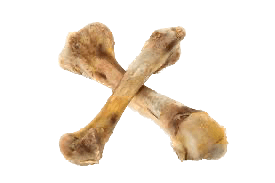

Bones are a natural source of essential minerals and nutrients that are beneficial for dogs. They are commonly known as beef bones, lamb bones, chicken bones, rib bones, oxtail bones, alpaca bones, kangaroo bones, deer bones, and bison bones. Bones can be traced back to the beginnings of domesticated dogs, as their wild ancestors would hunt and scavenge for food.
Bones, such as beef, lamb, chicken, rib, oxtail, alpaca, kangaroo, deer, and bison, contain essential minerals like phosphorus, calcium, magnesium, and potassium that play a crucial role in the dog’s muscle and organ functions. Additionally, bones are a rich source of omega-3 fatty acids, which can reduce the risk of bone diseases, improve the skin and coat, and may reduce the risk of heart disease in dogs. Iron and zinc found in bones are important for red blood cell production, while proteins supply chondroitin and glucosamine, two essential nutrients for maintaining healthy cartilage and joint tissue, reducing the risk of osteoarthritis. Bones also help keep a dog’s teeth clean by removing food debris from between the teeth.
Bones can pose a choking hazard, and cooked bones can splinter into shards, causing injuries to a dog’s mouth, throat, and intestines. Hard bones are not suitable for puppies and seniors with dental issues.
It is recommended to give one to two raw meaty bones per week and never feed cooked bones to prevent internal injury. It is important to supervise a dog when chewing on bones to prevent any accidents from happening. Remove any sharp pieces and take away the bone once it becomes too small.
Bones can provide essential nutrients that are beneficial for a dog's health. However, it is important to ensure that the bones are not cooked to prevent choking and internal injuries.
There are many benefits to feeding your dog bones, including improving their muscle and organ function, promoting healthy cartilage and joint tissue, and maintaining healthy teeth. Bones also provide essential minerals like calcium, phosphorus, magnesium, and potassium, as well as omega-3 fatty acids, iron, and zinc.
However, there are risks involved with giving your dog bones. Bones can pose a choking hazard, as well as cause internal injuries if cooked bones are consumed or if the bone splinters into shards. Hard bones are not suitable for puppies and seniors with dental issues.
Raw meaty bones are recommended for dogs, and it is best to give one to two per week. Supervision is important to prevent any accidents from happening, and the bone should be removed once it becomes too small and sharp.
If you're looking for alternatives to bones, you can consider fresh fruits and vegetables or raw meat diets. These options provide similar nutritional benefits without the risks associated with bones.
Have you ever given your pet a bone? How did they react? Remember to always supervise your pet and consider the risks involved before giving them a bone.